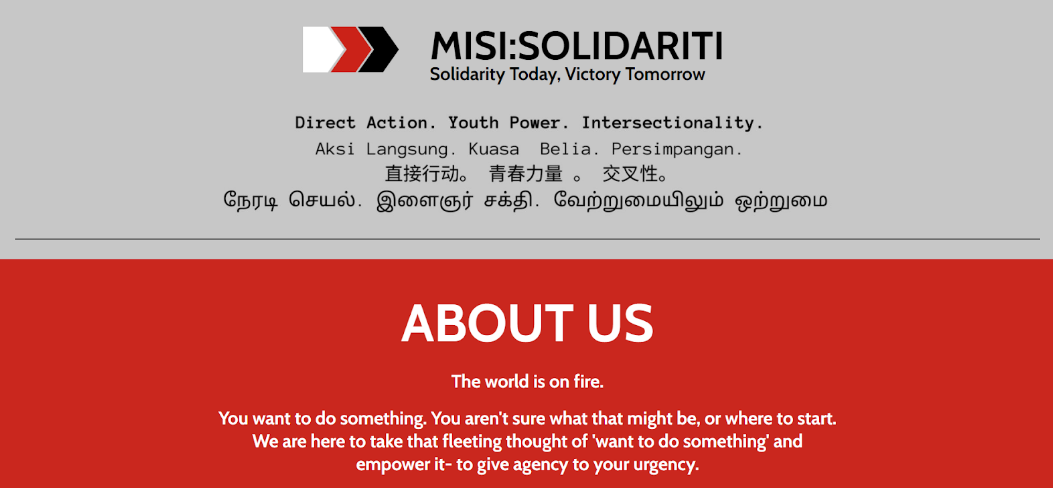Image Credit: The landing page of MISI:Solidariti official website.
Political advocacy among Malaysian youth is more like fireworks instead of steady flames changing the course of our socio-political climate.The need for change translates to multiple nationwide movements during the pandemic such as Bendera Putih (White Flag) and Bendera Hitam (Black Flag).
#benderaputih (#whiteflag) started when multiple jobless service and gig workers tied white cloths outside of windows or doors to signal the need for dire help. Sadly, these flags were popping out everywhere in lower social class neighbourhoods as the pandemic jeopardised their livelihood. With no job and no food to place on the table, the bottom 40% (B40) raised white flags as a sign of surrender, defeated by the pandemic.
I remember the time of strict restriction on movement, staying at home and staring at the world through my phone made me feel paralysed. When healthcare systems failed and the pandemic relentlessly took thousands of lives daily, we were living in a silent chaos. As lockdowns were prolonged, many felt the financial strain.
The number of young people advocating on social media was astonishing. As the government faced waves of political turmoil amidst this movement, the rakyat (the people) decided to take matters in our hands through charities, soup kitchens and nationwide donations. This phenomena started the #RakyatJagaRakyat, a noble movement where community members took care of each during the pandemic.
In 2022, I was in the midst of finishing my degree as a final year student in a spacious house with working wifi, reliable laptop and a functioning phone. Life went on but with a weak pulse – I sort of adapted my life with the changes of the pandemic. As a young student I had a lot to complain about as I adapted my life to a new routine. However, watching the pandemic hit underprivileged communities and families nearby, I felt guilty to live comfortably when others were hit so harshly.
This was when my journey to advocacy began. When restrictions loosened up in 2021, I attended a mamak when one of my friends said: ‘ You have so much fire in you, channel it to social media lah.’ Then he proceeded to show me the MISI:Solidariti Instagram page.
MISI:Solidariti is a youth-led advocacy group, powered by young wordsmiths on social media. The group was centre stage in mobilising Malaysians on social media.
Though it was a voluntary effort, numerous young people showed up on my monitor, all in tiny squares with one mission in common – to empower other young people through impactful online campaigns and create a community of young Malaysian advocates to share resources and tools to create change, be it big or small.
It was an exciting time to be in a movement and meet like-minded people, creating ripples of change in the socio-political sphere; however, when Malaysia was shifting back to normality,, when restrictions were lifted and we eventually started to ditch the masks – online youth movements also seemed to slow down.
It has been two years since the last pandemic lockdown in Malaysia, dated back to 1st of April 2022 and the whereabouts of young political advocates is quite dispersed. So, I scoured my linkedin page and reached out to one of MISI: Solidariti members, Anas Norazim to discuss the pulse of youth movements today.
Below are snippets of my interview with Anas, who is now an intern with BERSIH, a coalition for clean and fair elections. BERSIH is a non-profit that started in 2006, aiming to push for a thorough reform of the electoral process in Malaysia.
Syaza: As a person who was an active member in youth political movements during the pandemic and now, you are a part of an active non-profit that champions electoral reformation in Malaysia, what do you think of the political movement among the young people in Malaysia?
Anas: Right now political youth movements are definitely in a lump but it is not something new. I would say that it has been like this since the fall of UMNO in 2018. Before 2018, there was a need for change hence, students fighting for the reintroduction of student unions as we can see in climate marches but what makes it different at that time compared to previous years were a substantial increase in numbers during marches and protests.
Let’s look at BERSIH for an example. Prior to 2018 there were thousands of people on the streets protesting for a change of government but once the opposition at the time won the election, the number of people willing to protest was low.
Syaza: Why do you think that is the case?
Anas: I don’t think it is the lack of interest. You can see it on social media platforms, there are always young people spreading awareness and being advocates. However, I would say that youth has little appetite to protest.
Syaza: Besides mass mobilisation, what do you think young people in Malaysia can do to create ripples of change?
Anas: I think young people should not just be aware of the political climate in Malaysia, however, their involvement is crucial too, there is a saying that goes: you might not be interested in politics but politics is definitely interested in you.
But of course, there are well off people who are privileged to choose to be ignorant and can get through life but the majority of young adults, we have to be at least aware of the political ongoing in Malaysia. If not, ultimately, the politicians will make the choices for you.
On my drive back home from the interview, I thought about how a single conversation with a like-minded youth advocate would not lead to thousands of youth to hold our politicians accountable and make change; however, it was a start to help me understand the pulse of young Malaysian advocates and whether it is still alive and well or fading out to oblivion.
Immediate drastic changes are not an overnight event but pushing the needle forward for better political governance and holistic policies stem from honest on the ground work done by young people leading projects and creating sustainable solutions.

